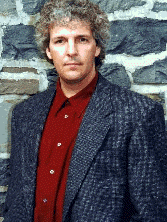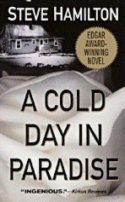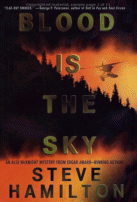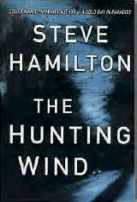A Conversation With Steve Hamilton
by Claire E. White
Bestselling mystery novelist Steve Hamilton

|
A Cold Day in Paradise was followed by four more bestselling sequels: Winter of the Wolf Moon (2000), which was named a Notable Book by the New York Times Book Review, The Hunting Wind (2001), North of Nowhere (2002) and his latest release, Blood is the Sky (2003). In Blood is the Sky, Alex heads north to Canada to help his Ojibwa Indian friend, Vinnie, (and, no, they don't like the term Native American) find his missing brother. It is a tautly written, moving story of friendship and revenge. Kirkus Reviews says of Blood in the Sky, "Hamilton won an Edgar and an Anthony in 1998 for A Cold Day in Paradise. This smart, brisk, twisty tale is even better."
Steve Hamilton lives in upstate New York with his wife, Julia, and their two children, Nicholas and Antonia. When he's not working, you might find him spending time with his wife and children, reading, or playing a round of golf. Steve spoke with us about his road to publication, how he juggles two busy careers, and how he created his popular character Alex McKnight. He also gives some great advice for aspiring mystery authors.
Did you write any fiction when you were growing up? What was the first thing you wrote -- and what was the reaction to it?

|
Was there anyone who encouraged you in your writing (or reading) when you were growing up?
I do remember a couple of English teachers who encouraged me, but beyond that it was just something that I knew I wanted to do eventually.
What led you to your job at IBM? Were you always interested in computers and technology?
You know, most days I don't like computers that much. Really. I got a degree in computer science because I saw how tough the job market was in the early 80's, and I knew it was a good practical thing to do. Of course, I took just enough computer courses to meet the requirements, and the rest was all English classes and other cool stuff, like linguistics and astronomy. The people I work with at IBM have been fantastic, and that's really why I've stayed there.
What led up to the publication of the first Alex McKnight novel, A Cold Day in Paradise? What prompted you to finally sit down and start writing?
I won this thing called a Hopwood Award at the University of
| "You know, most days I don't like computers that much. Really. I got a degree in computer science because I saw how tough the job market was in the early 80's, and I knew it was a good practical thing to do.... The people I work with at IBM have been fantastic, and that's really why I've stayed there." |
The idea of writing the first McKnight novel was pretty simple -- I saw this listing for the PWA/St. Martin's Press Best First Private Eye Novel Contest, which is one of two contests St. Martin's Press does every year (the other is for Best First Malice Domestic, i.e. traditional mystery). It looked like a great way to take a shortcut around the usual obstacles of writing the synopsis, sending the query letters to agents, etc. You just write a book and send it in! (Just write a book, he says.)
A Cold Day in Paradise introduces readers to the Alex McKnight, an ex-cop with a complicated past and more than his share of personal demons. How did you create the character of Alex?
When I decided to enter the contest, I thought it would be easy to write a private eye novel. I really did. I'd always loved reading them. And it seemed like they always started out the same way. Private eye in office, client comes in (usually beautiful woman or rich man), private eye and client size each other up, private eye takes the case. End of chapter one. I thought I could write something like that in my sleep.
Two weeks of vacation time later, with exactly two words committed to paper ("Chapter One"), I went back to work feeling like a total failure. I remember that January Monday very well, the day after the vacation ended. When I came back home that night, I went upstairs and turned the computer on, more or less just to torture myself. Then I just said the hell with it, I'm gonna write something. What came out was a character who was in the same mood I was. He felt like a failure. I just started following that and asking myself questions about what might have happened to this guy to make him feel this way. Eventually, I had this ex-cop from Detroit who was all alone in this cabin in the Upper Peninsula, trying to forget what had happened to him fourteen years ago.
How much of Steve Hamilton is there in Alex McKnight?
I honestly don't know. On the surface, not that much. He's older than I am. He doesn't have any children. He doesn't look for trouble, but it always seems to find him. Maybe deep down, though, we do have some things in common. Loyalty to our friends. A certain naïve optimism maybe. And we're both Detroit sports fans.
I'd like to talk about your latest novel, Blood is the Sky. How did this book come about?

|
Another interesting character is Alex's Ojibwa Indian friend, Vinnie Red Sky LeBlanc, who returns in this book after a long estrangement. How did you create the character of Vinnie? Was there anything in particular you were trying to avoid when writing him?
In the U.P., the Indians and everyone else sort of live together. There isn't this big separation like you see out west, with the reservation all fenced off in the middle of nowhere. That's obviously a great thing, and yet, at the end of the day, there is this subtle "distance" that you can't help noticing. They're part of something, this big extended family, and you're not. For Alex, I wanted him to have a friend who was on the other side of this distance, and of course I can only tell the story from Alex's point of view, as an outsider looking in. As far as what I was trying to avoid with Vinnie, I'm sure there lots of stereotypical things that I didn't fall into, but really, it's not like I intentionally made a list of things to avoid. Like any other character, if you do your job well enough, you're just naturally going to avoid the stereotypes, because they invariably flatten any character into a cardboard cut-out.
When visiting the Ojibwa reservation, one of Vinnie's relatives tells Alex, "You have such a lonely heart, it's hard to even look at you," which is a pretty shocking thing to say to someone, really. Alex has endured some terrible times since the first book -- he lost his wife, his career and his best friend. What went into your decision to have him be so tortured?
I'm not so sure if that was a conscious decision, or else just a sense that that's the way his life must have gone to make him the person he is. I mean, he's pushing fifty years old, and he's living by himself in a little cabin in one of the most remote small towns in America.
It seems as if Alex makes some real breakthroughs in this book, as far as reaching out to join the human race again. What went into your decision to have Alex become more connected?
Well, again, that just seemed like the way it had to be. If he's a real human being, he's going to be moving in some direction, a little bit every day. If he's cut off from the rest of the world, he has to be trying to make it back. If he's just drifting further and further away, then he's ultimately a hopeless character. And where's the fun in that?
Much of Blood is the Sky is set in Canada -- a pretty remote part of Canada, in fact. Did you spend much time out in the woods to prepare for this book? How did it affect you, being so far away from civilization that help was a plane flight away?
That goes back to that group of friends who go up there every summer. I've only done it twice, but it was something I knew I'd remember. I haven't been up there again, not recently. So I just tried to remember how it felt, standing on that dock, watching that plane disappear into the sky and knowing that it wouldn't be coming back for a week.
What was the greatest challenge in writing Blood is the Sky?
I don't think about the "structure" of a story that much, but I couldn't help noticing that most of the action happens in the middle, instead of at the end. Act Three was really all about trying to figure out why all the bad stuff happened in Act Two. I suppose you might worry about losing some of the tension that way, but I think I got away with it pretty well.
I'd like to talk about the practical side of writing. How did you get involved with a critique group? How has the group helped you with your writing?
Well, I talked about that group, the one that really got me back into the writing game. A few years have passed since then, and that group doesn't exist anymore. But I still have lunch with two of those guys, Frank and Bill. They're the only ones who read what I'm working on, while I'm doing it. Sometimes they rip it apart. I mean they absolutely murder it. They don't let me get away with anything other than the best I can do, and I'll always owe them a huge debt of gratitude for that. You have to have someone who respects you enough to tell you that the chapter you spent all week writing is total crap. Because when you finally give them something that works for them, you know it will work for everyone else.
Would you say that you are a visual person? When you are creating a new scene, do you picture how it's going to look? Or would you say sound is more important to you, for example, do you hear what the characters are saying?

|
If you were casting the roles of Alex McKnight and Vinnie LeBlanc for a feature film, what actors could you envision in the roles?
I'm going to take the fifth on this question, because a couple of actors are looking at it right now, and I don't want to jinx it. On this whole Hollywood thing, I've already seen enough to know that you'd better not even think about it. Just let your guy do his thing out there and you keep working on the next book.
What do you enjoy most about book tours? What do you dislike the most?
Easy questions. The best part is the hour I get to spend with people at the book store, just hanging out and laughing and talking about books. The worst part is the other 23 hours of traveling and being away from my family.
How much do you interact with your fans on the Internet and at signings? How does fan interaction affect your work?
I get a lot of mail via my website, and I answer every single note, because if you're going to take the time to write to me, I'm already humbled and amazed by that. And of course if you actually get in your car and drive to a store to see me in person, I'm even more humbled and amazed. You absolutely make my day by doing that. Affecting the work, though -- I'm not sure I even get that. If a writer is trying to please anyone other than his own "reader" self, then it's not going to work, period.
You balance many roles in life: husband, father, author and your other career at IBM. What's your secret for getting it all done? How do you prioritize with so many demands on your time?
| "I love writing, simple as that. I'm the luckiest guy in the world. I get to work very hard at what I love doing." |
As a father, what is your opinion on the amount of sex and violence in computer games, books, movies and tv today? What (if anything) should the government do to regulate content? What should parents do?
I have an eight year-old son and a three year-old daughter, so I do have to think about it. For me, just having a rating system of some kind, flawed as it might be, seems to work as well as anything. When Nickie is picking out a new Game Boy game, he knows it has to be rated "E." Aside from that and a little common sense, I honestly don't worry about it too much. (Ask me again when they're teenagers.)
What is your opinion of ebooks, from a technological standpoint? How do you see the technology evolving in, say, five years?
From what I've heard in the IT industry, the technological barrier all comes down to one simple problem: right now, it still hurts your eyes to read a lot of text on a computer screen. It is literally too physically demanding on your eye muscles to constantly adjust the focus. Some day, you'll have something about the size and weight of a notepad, with resolution as good as typeface on paper. When that becomes affordable, then it's off to the races. Five years? I don't know. That might be a little soon, but who knows?
If you could go back in time and have a chat with your 16 year-old self, what would you tell young Steve?
I would tell him to hang in there, that it's all going to work out beautifully. There's this great quote I'm trying to remember, but can't find the exact words. It's something about how most people spend half their lives trying to change the one thing they don't like about themselves, when in fact they should be embracing it because it's the thing that makes them truly themselves.
What's your advice to the aspiring mystery writer who's feeling a bit discouraged these days?
I'll spare that writer the pep talk. For a good practical solution, look at the two contests that St. Martin's Press runs every year. I already talked about them above, and how they're a great way to jump over all the hurdles at once. So many other writers have gotten their start through those contests -- Les Roberts, Karen Kijewski, Donna Andrews, and Julia Spenser Fleming to name just a few. I've been a judge now, too, and I can guarantee you one thing -- if you write a good book, it will make it down to Ruth Cavin's desk. You can go their website to find out more about both of the contests.
There, that's my plug of the day. Now go write a good book. One brick every day, that's how you do it.
Return to the June 2003 issue of The IWJ.
More from Writers Write
